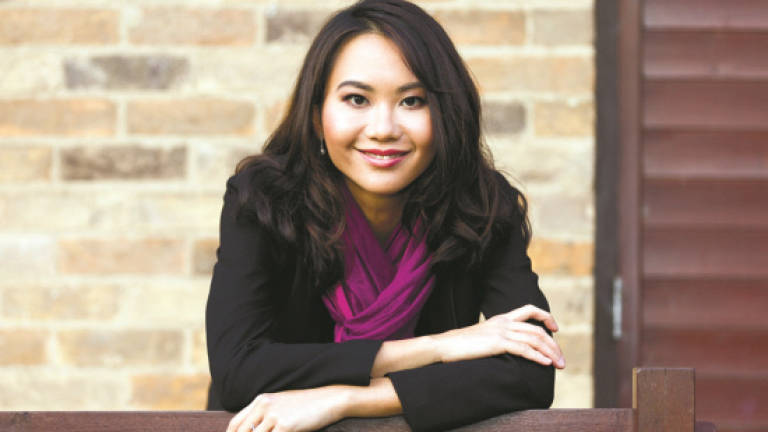Catching elusive memories

FELICIA Yap grew up in Kuala Lumpur but currently lives in London. The 35-year-old has been a radioactive-cell biologist, a war historian, Cambridge lecturer, technology journalist and theatre critic, flea-market trader and catwalk model.
Now, she has added author to her resume. This graduate of the Faber Academy's creative writing programme has come out with a remarkable story about a world divided by how much one can remember for her debut novel.
Yesterday tells of the elite Duos who can remember two days' worth of memories while the masses, the Monos, can only remember one day. In order to overcome this 'amnesia', everyone keeps an electronic diary.
The story centres on a couple – Mark, a Duo, who is a best-selling author with political ambitions, and Claire, his Mono housewife.
Their seeingly-perfect world comes tumbling down when the body of a woman, who turns out to be Mark's mistress, is found dumped in a river near their home.
Investigating detective Hans Richardson (a Mono trying to hide his shortcomings) is determined to find the killer using the victim's own memories.
In an email interview, Yap talks about the inspiration behind Yesterday.
What sparked off the idea to write a book about a world divided by how much a person can remember?
"The idea for Yesterday came to me on the move. My fiancé and I were on our way to a dance studio in Cambridge when a question just rose to my head:
'How do you solve a murder when you only remember yesterday?'.
"The concept so intrigued me, I couldn't stop thinking about it even after we got to the venue and began practising our tango.
"I worked out the initial contours of the novel on the dance floor, between our twists and turns (you could say that twists and turns were part of the fabric of Yesterday, right from the book's conception).
"A second idea also struck me that night – a 'what-if' question: 'What if the entire world is divided between people who could only remember one day, and people who could remember two?'
"I began wondering if an extra day's worth of memory really does make a difference, especially within a domestic setting.
"I was so hooked by these two questions, I began writing the next morning."
Most of what we learn about Mark and Claire are based on their diary entries. However, the best information on them comes from the murdered woman's diary.
Do you think someone on the outside can give a clearer reading of you than you can about yourself?
"Oh, most definitely. It's easy for us to delude ourselves, thinking we are the people we're not.
"Yesterday is really about our capacity for self-delusion, how we choose to remember specific (and often more palatable) things about ourselves.
"More often than not, someone on the outside can give a clearer reading simply because they don't have any emotional baggage which clouds judgement.
"With Yesterday, I also wanted to turn the table on ourselves. I wanted to explore how a person with full memory might suffer in a world of amnesiacs, in the same way people with memory problems tend to suffer in our own world.
"In Yesterday, my villain Sophia has full memory. This gives her unique insights into the memory-deficient world she inhabits. She's indeed a person on the outside, one looking into the world I've created.
"I also wanted to explore the connections between memory, love and hate. How Sophia's ability to remember the past, in particular, causes her to love … or hate."
Since the past depends on what the characters wrote on their e-diaries, like Hans, we are left to wonder how much is real and how much is perceived. Was that intentional on your part?
"Definitely. I wanted the book to hold up a mirror to ourselves, to our own self-perceptions.
"The people in Yesterday are really not that different from ourselves. How they make memories is fairly similar to how we ourselves make memories.
"They write diaries to remember certain things about themselves. So do we. And … what goes into diaries are often preferential statements about our lives.
"Yesterday is really about what we choose to tell ourselves ….
"Studies suggest that 80% of what we remember – what we think happened – isn't actually what occurred. I wanted to explore what we choose to remember (and why we do so), how we often embellish details in our heads.
"It's a story about the lies we tell ourselves, masquerading as memories."
Who are your literary inspiration?
"I'm inspired by Kazuo Ishiguro. I love the understated yet incredibly precise nature of his storytelling, the visceral beauty of his prose. I found Never Let Me Go particularly inspirational while writing Yesterday.
"Ishiguro's story of a couple who knew all along that they loved each other (but never showed it until the final scene when they embraced and never let go) is incredibly powerful and heart-wrenching.
"It gave me ideas for the love story in Yesterday, the ways I could describe the complex love relationship between a couple who had stayed with each other for 20 years.
"F. Scott Fitzgerald is an utter genius at creating charismatic characters, such as in The Great Gatsby.
"I was particularly inspired by the destructive and tragic love relationship between the two main protagonists in (Fitzgerald's) Tender is the Night, and the sacrifice Dick Diver makes by rehabilitating his wife Nicole … at his own expense."
Are you working on another book right now?
"I am writing the prequel to Yesterday, entitled Today. It's also a thriller with a love story at its core, set in the same speculative world as Yesterday.
"My detective Hans has to solve his first major case (involving the disappearance of the girl he loves) before he loses his short-term memory, at the age of 18."